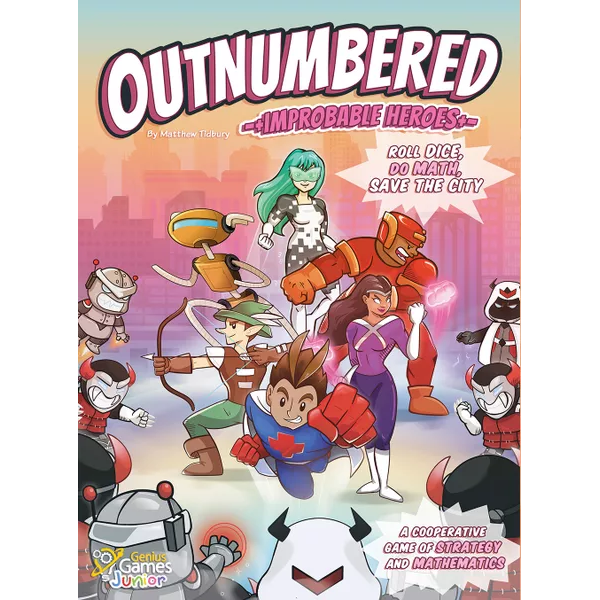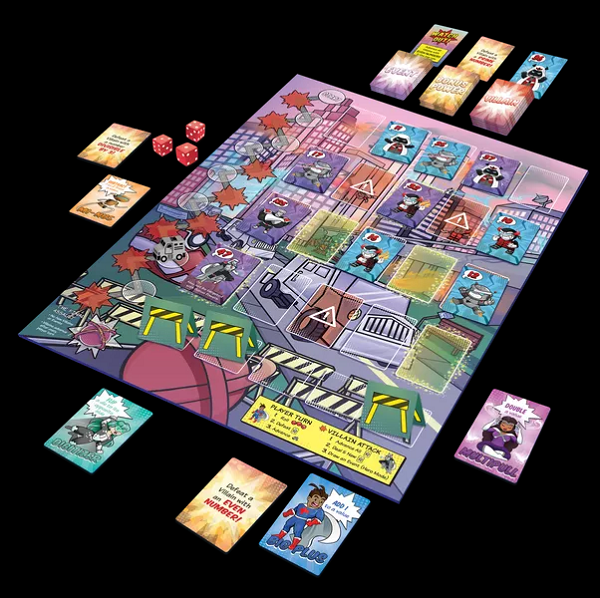Outnumbered: Improbable Heroes – A Cooperative Mathy Puzzle

Absolute Zero wants to steal the infinity generator and make a powerful weapon! It is up to a daring team of heroes, and lots of math, to save the day.
Published by Genius Games, Outnumbered: Improbable Heroes aims to be a cooperative, family-friendly, educational math board game. But is it also fun?
Gameplay
The board is set in the middle of the table. It shows five columns, with each column consisting of four spaces. At the end of each row a barricade card is placed, and in the top space of each column a villain card is placed face-up.
There are two levels of difficulty: sidekick mode and hero mode. For sidekick mode, you only put the standard level of villain cards into the draw deck, while for hero mode you add all the villain cards into the draw deck, and include the Absolute Zero boss card in the bottom half.
Next, the infinity generator truck is placed at the start of its track on the board. Each player chooses a hero (each hero has a unique ability) and takes one bonus power card.
On your turn, you roll three dice. You may add, subtract, multiply, and divide the results of these dice in any combination. You can also square any value (either a single die’s value or a value that you make from the dice). You can also use your hero power once per turn. These powers include, for instance, doubling a value or adding one to a value.
Each villain card has a number on it. In order to defeat a villain card, you must use your dice to make the number listed on it. You can defeat more than one villain card on your turn. If you defeat a villain card on a yellow space, you also get to draw a bonus power card (unless you defeated that villain with a bonus power card).
On your turn, you can play your bonus power cards to defeat a villain card. These have abilities such as defeating any villain card that has a prime number on it or one with an even number on it.
Once you have finished your turn, you move the infinity generator truck one space forward on its track. If it moves onto a red space, then the villains attack. All villain cards move forward one space on their columns. If a villain card is at the end of its column when it moves, it hits the barricade, and both it and the barricade card are discarded. If a villain card is at the end of its column and moves forward after that column’s barricade has already been discarded, then the players lose the game.
After all the villain cards have moved, you draw a new villain card for the top space of each column. Finally, if you are playing hero mode difficulty, you draw an event card. These will often trigger certain villain cards to move again or force you to draw more.
It is now the next player’s turn. Play continues until the infinity generator truck reaches the final space on its track. You then move into the final assault phase. During this phase, no new villains or events are drawn, but all villain cards move forward at the end of each player's turn. If the players manage to defeat them all, they win the game. You then count up your points, earning ten for winning the game, three points for each barricade you still have on the board, and five points if Absolute Zero was drawn and defeated.

Review
Outnumbered: Improbable Heroes is a surprisingly entertaining game. It reminded us a little of Castle Panic, trying to choose which villains to defeat on your turn and which to leave for other players, when to use your special bonus cards, what to target with them, when to sacrifice a barricade, and trying to stop from being overrun.
Some people can’t abide math, and for others, the clear educational angle will be a turn-off, but we found the game quite engaging and definitely challenging. We leaned heavily into using the bonus cards to get rid of the more complex numbers and still lost during the final assault (although we did manage to take Absolute Zero down with us).
The two difficulty modes are essential for helping you to balance the game depending on the age of the group you’re playing with. If playing as a family, younger children will definitely struggle with hero mode (at least that’s what I’m telling myself after losing to it). Its fun to figure out the various ways you can combine your dice and hero power to get different numbers, and using that to figure out which villains you can target and which ones you should target based on the state of each column and their barricades.
Gameplay rules are fairly straightforward, although the rules could be a little clearer on an element or two — for example, how many times you can square a result? Can you just keep going to push the number higher and higher? You can make an educated guess but it’s always nice to have a clear answer.
Outnumbered: Improbable Heroes is definitely going to be a niche game, but it is a game that is nicely put together. It’s designed for families, but for the right group, it can reach beyond that audience. It’s a challenging puzzle and we were surprised by how much fun we had with it.
Pros: Challenging, two different difficulty modes, engaging puzzle
Cons: Educational theme may turn some players off, one or two points in the rules could be clearer
Disclosure: we received a complimentary review copy of this game.







